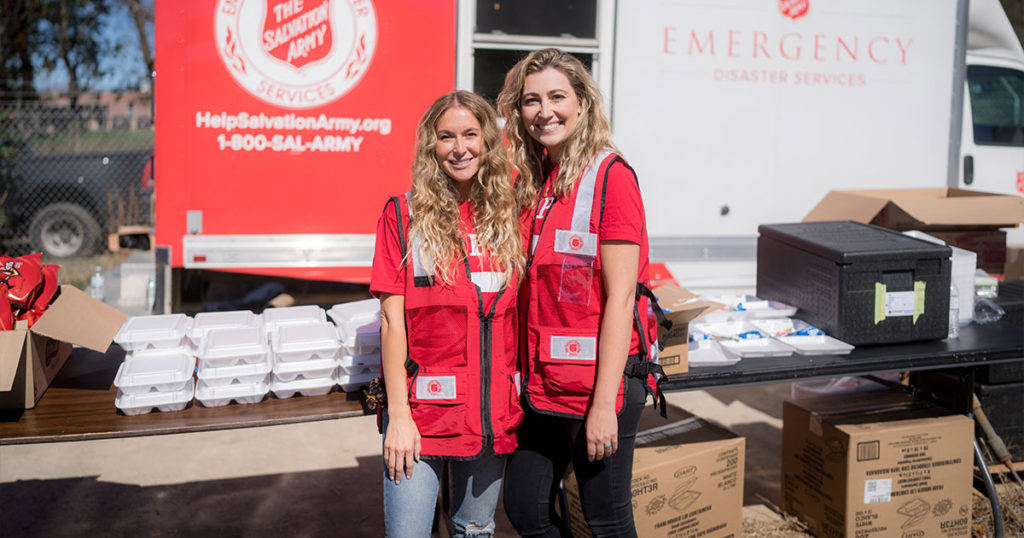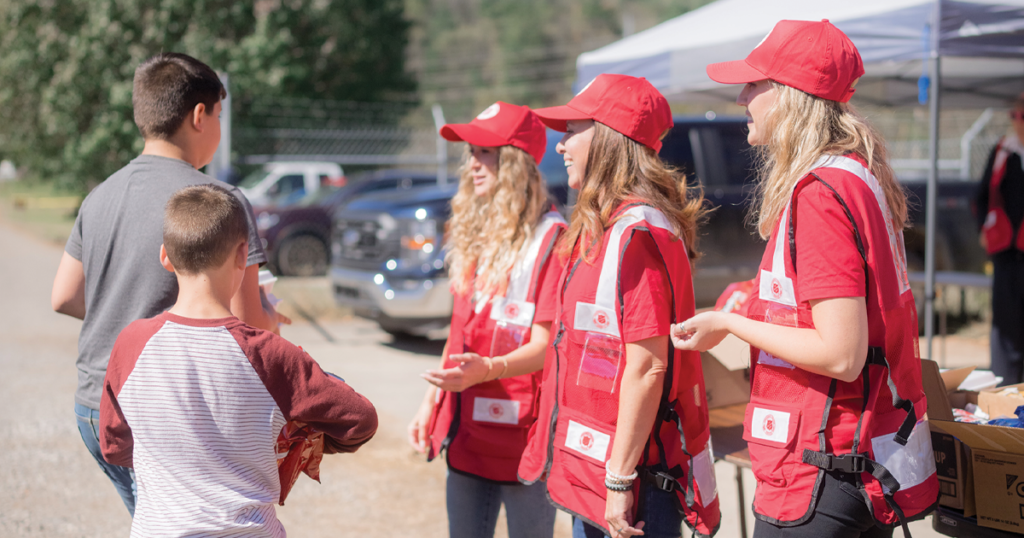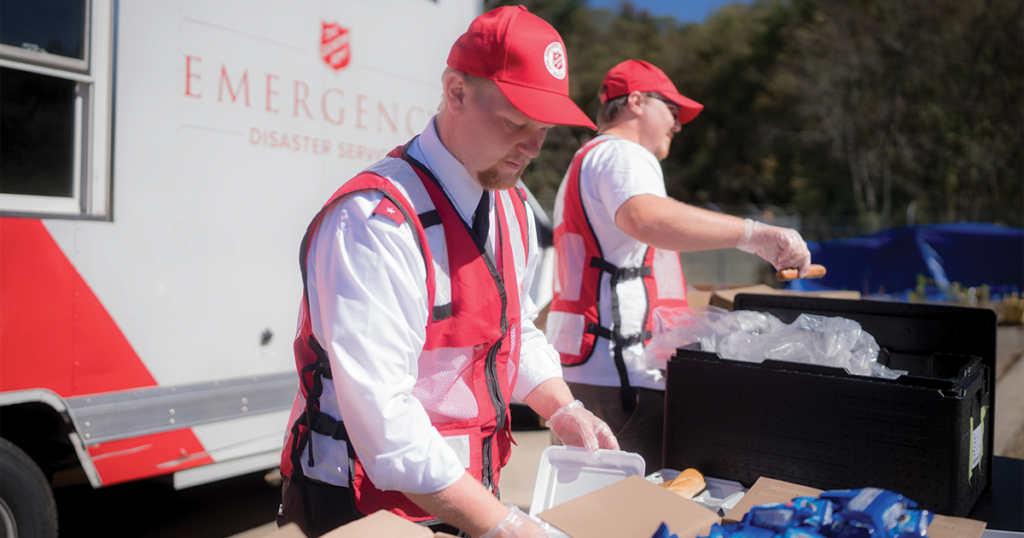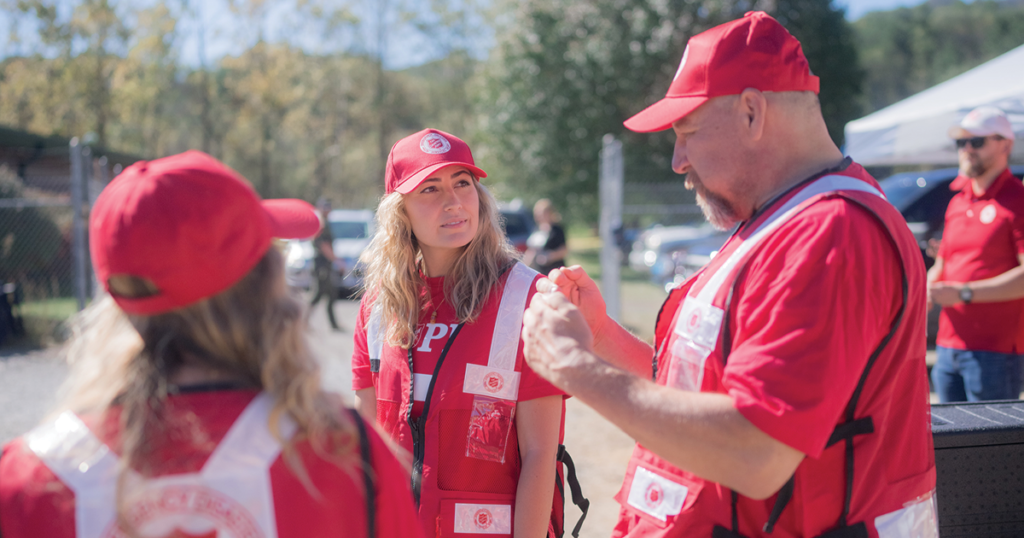A Day in the Life of Disaster Responders
"My heart hurts for this county and I’m going to do everything I can to make sure these people are okay.”
This past fall, two hurricanes devastated the American southeast. As can be expected, The Salvation Army was on the scene in all the affected areas — even the most remote locations. The Salvation Army is widely recognized for its extensive Emergency Disaster Services (EDS), offering food, shelter, supplies and spiritual support to anyone in need. But what do we know about the people who dedicate themselves to this cause? What does a day in that life look like? After spending some time on the ground in Tennessee with the exceptional men and women who responded to Hurricane Helene, I can offer a glimpse into their daily efforts.
While disaster workers must remain flexible, as each day’s needs are unpredictable, there is a certain rhythm to their day. For Nathan Casteele, that starts at 8:30 a.m. Volunteers, employees and officers gather at a central location to begin their day with coffee, a quick breakfast and meetings. They recap the ongoing efforts and previous day’s work before moving on to the current day’s needs: who’s needed where and doing what. Nathan says that there’s also a lot of praying and encouraging one another. For this EDS team, the officer in charge leads the group in Scripture reading and shares encouraging stories.
Afterward, the canteens are checked and packed to ensure they have everything they’ll need for the day. Sometimes canteens deliver only water; other times, they deliver entire meals. Supplies are restocked and extras are stored for tomorrow. Canteens are also shared across Salvation Army regions.

Next, the teams move out to their designated relief sites, about an hour after the day begins. Nathan says it’s not unusual to spend ten or more hours working at a site, but it never feels draining. “Yesterday, I was out all day long, but I felt like I was out for two hours just because I enjoyed what I was doing, and the people around me were enjoying what they were doing. It went by too fast. Although the work was significant, it didn’t feel like it.”
One thing all EDS workers can expect is connection. People who come seeking help are often also looking for someone to talk to and confide in about their struggles. This is where the Army excels, with officers on the scene to pray for survivors and offer their concerns to God. Captain Jane Monroe of Nashville Citadel describes her approach to providing spiritual nourishment, which often starts by simply asking someone how they’re doing. Before long, people are often willing to share what they’re going through. Then, she prays with them.
“There was a grandma who came through concerned about her grandson, who is less than a year old and needed a surgery,” Captain Monroe said, recalling one of her many prayerful encounters. “The storm had delayed that, and then when he did get his surgery a couple days later, she came back, showed me a picture, let me know the surgery was successful and that her grandson was doing great.”
But offering prayers is only one of many responsibilities for EDS workers. When Nathan is on the job, he typically handles tasks like loading and unloading trucks, manning canteens, and delivering supplies to multiple sites across the county. He’s just one of countless volunteers serving God and the community, despite his ongoing struggles. For example, Nathan is an amputee, serving the region on a prosthetic leg. But that doesn’t stop him from spreading God’s love. “God works through giving,” Nathan says. “We talk about being [God’s] hands and feet; we’re out there giving out our time, our energy, our resources, and there’s freedom in that. There’s freedom in giving and I’ve been enjoying the giving.”

Giving in the midst of one’s own struggles seems to be a common trait among disaster responders. Take Ellen Watkins, a community leader in Mountain City, Tennessee whose nonprofit partnered with The Salvation Army in the wake of Hurricane Helene. For her, the day starts at 6:00 a.m., and many times she’s not home until midnight. She manages one specific disaster relief site where survivors can drive through to get much–needed supplies, a hot meal and spiritual support. Ellen coordinates volunteers, ensures supplies are delivered and makes sure donations continue to come in. It’s a demanding job. She also prioritizes her volunteers’ well-being, making sure they take the time for self-care and maintaining their homes if they’ve been affected by flooding. But here’s the kicker: Ellen’s own home was flooded by Helene, and she’s put that on the backburner while continuing to provide assistance to others.
“I know how to control my own damage,” Ellen said when asked why EDS work takes priority over her home. “These people, they’ve never experienced this, but I have been in disaster coordinating for a long time … I know these people are hurting out here. This is a very rural county. It’s a very poor county. My heart hurts for this county and I’m going to do everything I can to make sure these people are okay.”
Ellen also expressed gratitude for The Salvation Army’s work in EDS. “I’m just floored by how they’re loving people, praying over people, feeding people. Not only are they feeding them food, they’re feeding them Jesus. It’s just been a perfect match. It’s just been beautiful.”

There’s nothing mundane or routine about EDS work, but sometimes a day’s “schedule” is interrupted by a familiar face. In the case of this Hurricane Helene response, actresses Alexa PenaVega (“Spy Kids”) and Taylor Dooley (“The Adventures of Sharkboy and Lavagirl”) drove more than four hours to join the effort. The two women manned The Salvation Army’s canteen at the Mountain City response site, handing out hot meals and praying with those willing. “It’s easy to just say you’ll pray for someone,” Taylor said, noting that it can be harder, but more impactful, to pray in person.
Alexa praised the volunteers from the Mountain City community, saying how meaningful it was to see “people of all ages working together” to affect change in the wake of disaster. Alexa has a long history of working with The Salvation Army, notably serving during the response to the fires in Maui in 2023. Alexa and Taylor spent their time brightening others’ days, working alongside volunteers and joking about how they are often mistaken for each other by fans.
At the end of the day, volunteers and workers regroup to go over the day’s events and decompress before heading to some well-deserved rest, which, depending on the location, isn’t always the most comfortable. But they give of themselves because it’s what God has asked them to do, so they go to bed with a smile on their face, ready to do it all over the next day.
Support the mission
Donations to support the work of The Salvation Army can be made online at salvationarmyusa.org







